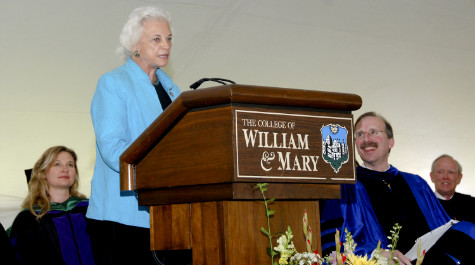Justice O'Connor Urges Graduates to Be "Bridge Builders"
Retired U.S. Supreme Court Justice Sandra Day O'Connor urged William & Mary Law School's 2010 graduates to make a commitment to "being bridge builders" during her remarks at the Law School's May 16 graduation ceremony. Noting that the date marked the eve of the 56th anniversary of the Brown v. Board of Education decision that brought an end to racial segregation in schools, she counseled graduates to find inspiration in the landmark case. "The bridge to Brown ... was paved by many, many small stones in the road, laid by young lawyers ..., " she said.
In his introduction, Dean Davison M. Douglas noted that Justice O'Connor influenced the Supreme Court's jurisprudence in critical areas during her 24-year tenure on the Court. Since she stepped down from the bench, he said, she has championed the public good as an ardent advocate of judicial independence and civic education. Since assuming the role of William & Mary Chancellor in 2006, he said, she also "has become among both students and faculty, one of the most beloved members of the College community."
The Justice began her remarks with some humorous observations about her duties that day. She shared a tongue-in-cheek observation about the perplexing task given to commencement speakers: "... the speaker is given no topic and you're expected to inspire all the graduates with a stirring speech about nothing at all." Which is why, she added with a sly smile, that the honor often falls to lawyers: "They are in the habit of talking too much, even when they have nothing to say." She noted that the Law School extended the honor to her, someone who was "not only a lawyer, but an elderly judge." To that, she added, with obvious relish, "I was born in Texas, and in Texas they say 'an old judge is like an old shoe, everything is all worn out except the tongue.'"
Seizing the opportunity to speak to the newest members of the profession, she reminded them that their "first obligation ... is to know the law and to be able to analyze and resolve legal issues." However, evoking the words of Justice Benjamin Cardozo, who said that "membership in the bar is a privilege burdened by conditions," she said that each graduate must be cognizant of the "moral and social aspects of the lawyer's power and position as an officer of the court." She also stated that lawyers must cultivate the ability to "disagree agreeably." "It makes all the difference," she said.
O'Connor recalled the day she received her law degree, "by far the biggest, most important day in my life to that time," and recounted the challenge she faced in the job market. Her career in public service "was born of necessity," she said. Finding the doors of law firms shut to her as a woman, she volunteered in a county attorney's office for months until a paid position became available.
Defining public service as "the task of building bridges for other people coming behind you and for the nation as a whole," she urged graduates to find a way to work in some capacity for the public good. "We have a great nation, only because we had bridge builders in the past who gave of themselves in ways that mattered."
In closing, she reminded the audience that advocating for justice is never easy and the outcome never assured. Yet, engaging in work that benefits others - whatever setbacks and challenges one faces -"is what makes a life worthwhile."
"Focus your energies on sharing ideas, finding solutions, and using what's right with our country to remedy what's wrong with it," O'Connor said. "Use your talent to try to make a difference because you can. ... Bridges are built by the people who look to the future and who are determined to help others along the way. .... Commit yourselves to being bridge builders. We need you. And everyone who crosses those bridges you worked on will thank you."
